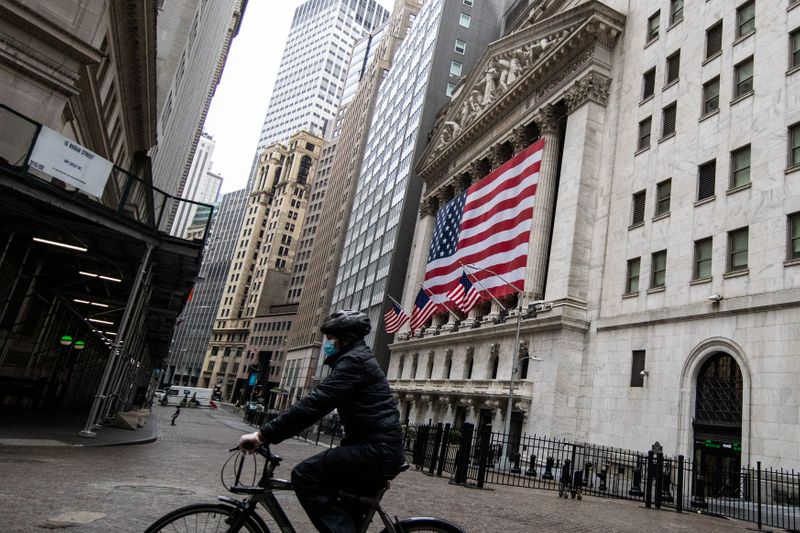By Tom Westbrook, John McCrank and Gaurav Dogra
SINGAPORE/NEW YORK/BENGALURU (Reuters) - As market volatility has eased after the mayhem of March, investors betting on a rocky economic recovery from the coronavirus crisis are buying shares of exchanges that are poised to profit if more turmoil ensues.
The global exchange sector, which thrives in turbulent markets, has outperformed so far this year, falling only 2% in value compared with a 15% drop in world stocks, a Reuters analysis showed.
As countries around the world went into lockdown to slow the spread of the coronavirus, investors repriced the value of assets including stocks, commodities and derivatives, such as futures and options, to reflect recessions. That led to a surge in trading activity as investors tried to hedge positions, while others made bets on where markets were going to bottom out.
Financial exchanges, such as Singapore Exchange Ltd (SI:SGXL), Deutsche Boerse (DE:DB1Gn) and New York Stock Exchange-owner Intercontinental Exchange Inc (N:ICE), all saw profits jump as trading-based fee revenues surged.
Asia's bourses, which are more reliant on volumes than their global peers, have gained the most, the analysis showed, as investors reckon they are best placed to benefit from further volatility.
"I think on balance the trends that have been in place will continue for quite a while," said Scott Gilchrist, who manages an A$680 million ($440 million) portfolio of Japanese stocks at Australia's Platinum Asset Management (AX:PTM).
"It's very hard to tell, but my sense - and it's only a gut feel - is that we haven't fully passed through this period of volatility yet," he said.
Gilchrist's fund has been increasing exposure to Japan's GMO Internet Inc (T:9449), owner of a forex trading platform where volumes have been surging, as has GMO's stock, up 9% this year, compared with a 17% drop on Japan's TOPIX index (TOPX).
(GRAPHIC: Exchange operators and MSCI World Index's performance this year: https://fingfx.thomsonreuters.com/gfx/mkt/xegpbkorrvq/Exchange%20operators%20and%20MSCI%20World's%20performance.jpg)
The 2% decline in the sector globally is largely due to poor performers in Latin America and Africa, obscuring a standout run by Asia's bourses, led by Singapore's SGX, which is benefiting from the uncertain recovery.
"It's a really hard call to make," Michael Syn, head of equities at SGX, where profit hit a 13-year high last quarter amid record turnover, said of the outlook. Markets' optimism seems out of sync with the real economy, he said.
"Is the market pricing in a long future, saying, 'let's not worry about the detail of how we get there?' Or will it suddenly have an aha moment of 'oh my God, I didn't quite understand how bad things are.'"
SGX stock is up 7% this year, one of just two gainers on the national Straits Times Index (STI).
Elsewhere, Deutsche Boerse is up about 3% year-to-date and NYSE-owner ICE is up just under 1%, compared to declines in the DAX (GDAXI) and Dow Jones Industrial (DJI) indexes of around 19% and 16.5%, respectively.
(GRAPHIC: Singapore exchange 's out-performance: https://fingfx.thomsonreuters.com/gfx/mkt/bdwvkrzogpm/Singapore%20exchange's%20out-performance.jpg)
ASIA'S STRATEGY PAYS OFF
Investors have sought out Asia's exchanges for their high exposure to trading volumes, driving share prices up almost 3% this year compared with declines of about 1% for U.S. exchanges and 5% in Europe.
Over the past decade as U.S. and European peers diversified by purchasing data providers and other adjacent businesses to bring in non-trading revenue, which is more stable, Asia's bourses tended to pursue new financial products, leaving them more dependent on trading revenues, but also with lower debt.
"Everyone's really concerned about recapitalisations, refinancing," said John Pearce, chief investment officer of Australian pension fund UniSuper, the top shareholder of domestic bourse operator ASX Ltd (AX:ASX).
"Well, the ASX has got none of those concerns - it's got no debt and market volatility is actually positive for the ASX, so what you're really seeing is the market pricing it as a pretty stable annuity," he said.
(GRAPHIC: Exchanges monthly trade volume by region: https://fingfx.thomsonreuters.com/gfx/mkt/xlbvgnlkepq/Exchanges%20monthly%20trade%20volume%20by%20region.jpg)
To be sure, a repeat of the stratospheric trade volumes of March seems unlikely, especially considering the scale and breadth of the liquidation during the sell-down.
But investors have pointed to Singapore's diversification across asset classes from forex to commodities, Hong Kong Exchanges and Clearing House Ltd's (HK:0388) exposure to China, and technology investment by ASX as boosting long-term prospects.
"Recent outperformance, or resilience, is driven mostly by market volatility," said Kristy Fong, senior investment director of Asian equities at Aberdeen Standard Investments in Singapore, whose funds own all three stocks. "We see these stock exchanges as a good proxy for markets, and given that they are pretty much monopolies with good cash flow, it is quite a safe way to get exposure."
(GRAPHIC: IPOs at leading exchanges in the first quarter: https://fingfx.thomsonreuters.com/gfx/mkt/yxmpjonzkvr/IPOs%20at%20leading%20exchanges%20in%20the%20first%20quarter.jpg)
MONETARY HEADWINDS
Policymakers responded to the coronavirus crisis by slashing interest rates and flooding markets with liquidity. That prevented a quick wave of mass defaults, boosting investor confidence and dampening the wild market swings of March.
The potential for a prolonged bout of rock-bottom rates and lower volatility presents the biggest headwind for exchange operators.
Record trading volumes in the first quarter eased into the second quarter as volatility declined, Ed Tilly, chief executive of Chicago-based stock and options exchange operator Cboe Global Markets (Z:CBOE), said on an earnings call last week.
"No one can say with certainty how this situation will play out, but the path to recovery is unlikely to be linear," he said.
CME Group (O:CME), the world's biggest futures exchange operator and also based in Chicago, saw average daily volumes halve last month, compared with March.
Nevertheless, volumes are up from a year ago and CME's executives were upbeat about the outlook on an earnings call last week.
Other operators have seen silver linings, such as a surge in emergency capital-raising in Australia, benefiting ASX.
"I wish every company we owned was trading like ASX," said UniSuper's Pearce.

(GRAPHIC: Performance of some key sectors this year: https://fingfx.thomsonreuters.com/gfx/mkt/oakvezobrpr/Performance%20of%20some%20key%20sectors%20this%20year.jpg)